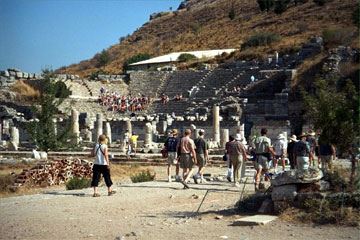« Ephesus in the New Testament | Home | Artemis and Her Temple »
The Apostle Paul in Ephesus
By Mark D. Roberts | Wednesday, August 15, 2007
Part 6 of series: Ancient Ephesus and the New Testament
Permalink for this post / Permalink for this series
In my last post I quoted a passage from Paul’s first letter to the Corinthians in which he wrote, “But I will stay in Ephesus until Pentecost, for a wide door for effective work has opened to me, and there are many adversaries” (1 Cor 16:8-9). This fits perfectly with the picture painted of Paul’s Ephesian ministry in Acts of the Apostles.
In Acts 18, Paul visited Ephesus briefly on his trip from Corinth back to Jerusalem (18:18-22). Verse 24 introduces a Jewish teacher named Apollos, who taught in the synagogue in Ephesus. This synagogue hasn’t been located by archeologists. Apollos accurately passed on some truths about Jesus, but didn’t know the whole story. So a leading Christian couple, Priscilla and Aquila, taught Apollos the what he had been missing. More fully informed, Apollos journeyed on to Corinth.
 Acts 19 begins with Paul’s appearance at Ephesus. First, he laid hands on some disciples who received the Holy Spirit with power (19:1-7). Next, he presented the message of the kingdom of God in the Jewish synagogue, arguing persuasively. But when most of the Jews were closed to Paul’s message, he moved to the lecture hall of Tyrannus, where he continued preaching for two years. Today we do not know exactly the location of this lecture hall. In all likelihood it was a place where the men of Ephesus gathered for lectures on various subjects, including philosophy and religion. Ephesus was well known in the ancient world as a place of learning, and Paul would have been seen as one more philosopher with a tempting message offering transformation and immortality. (The photo to the right shows the Odeum in Ephesus, a theatre that could seat more than 1,000 people. Public lectures were given here. This was also the place where the city business was done. Photo from http://www.holylandphotos.org/.)
Acts 19 begins with Paul’s appearance at Ephesus. First, he laid hands on some disciples who received the Holy Spirit with power (19:1-7). Next, he presented the message of the kingdom of God in the Jewish synagogue, arguing persuasively. But when most of the Jews were closed to Paul’s message, he moved to the lecture hall of Tyrannus, where he continued preaching for two years. Today we do not know exactly the location of this lecture hall. In all likelihood it was a place where the men of Ephesus gathered for lectures on various subjects, including philosophy and religion. Ephesus was well known in the ancient world as a place of learning, and Paul would have been seen as one more philosopher with a tempting message offering transformation and immortality. (The photo to the right shows the Odeum in Ephesus, a theatre that could seat more than 1,000 people. Public lectures were given here. This was also the place where the city business was done. Photo from http://www.holylandphotos.org/.)
Paul’s ministry flourished, in part because of the power of God that brought healing and deliverance from demonic oppression. Many Ephesians who had been enamored with magical practices (what we’d call dark magic, not stage magic) renounced these practices and publicly burned their books of magic.
This sounds innocuous enough to us, but it doesn’t take too much imagination to see how the success of Paul’s ministry led to trouble. Magic and superstition permeated Ephesian culture, so that the burning of magic books would have seemed antisocial. It would be rather like if a whole bunch of people in my city got together and burned their PDAs, Daytimers, and cell phones. Moreover, the people who wrote, bought, and sold books of magic would rightly have perceived an economic threat from Paul and those influenced by him.
This latter issue, the economic danger posed by Paul, in fact led to a major brouhaha in Ephesus. I’ll examine this more closely in my next post.
Topics: Archeology and the Bible |
One Response to “The Apostle Paul in Ephesus”
Comments
Thanks for your willingness to make a comment. Note: I do not moderate comments before they are posted, though they are automatically screened for profanities, spam, etc., and sometimes the screening program holds comments for moderation even though they're not offensive. I encourage open dialogue and serious disagreement, and am always willing to learn from my mistakes. I will not delete comments unless they are extraordinarily rude or irrelevant to the topic at hand. You do need to login in order to make a comment, because this cuts down on spam. You are free to use a nickname if you wish. Finally, I will eventually read all comments, but I don't have the time to respond to them on a consistent basis because I've got a few other demands on my time, like my "day job," my family, sleep, etc.
You must be logged in to post a comment.















August 15th, 2007 at 9:52 am
It’s fun to take the book of Acts and work with Paul’s letters to try and recreate his life, or at least understand it. There are so many holes. In particular I wish Luke had continued Acts to tell us about Paul’s death.
So many questions.